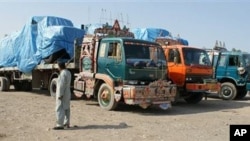The Pentagon says a U.S. helicopter based in Afghanistan fired in self-defense during an incident that apparently caused the deaths of three Pakistani soldiers at a border post, and led Pakistan to close a key supply route.
The NATO command in Kabul says at least one of its helicopters crossed briefly into Pakistani airspace Thursday to fire on an insurgent position inside Afghanistan. Shortly afterward, the command says, the helicopter received small arms fire from the Pakistani side of the border, and returned fire.
The Pakistani Army says two helicopters crossed the border and fired on a Frontier Corps outpost 200 meters inside its territory. The statement says the helicopters shot at the troops first, and that they responded with rifle fire to indicate that NATO forces had entered Pakistani airspace. Pakistan says the helicopters fired two missiles, destroying the border post, killing three soldiers and wounding three others.
At the Pentagon, a senior spokesman, U.S. Marine Corps Colonel David Lapan, says the Pakistanis fired first and that the response should not be surprising.
"Even the statement that the Pakistanis put out indicated that their forces used rifle fire at the helicopters as a warning. And, well, if you fire at a helicopter in a combat zone, they'll usually take that as hostile and return fire," he said.
The NATO command in Kabul expressed condolences for the deaths of the Pakistani troops, and said the two sides are reviewing the incident to determine what happened.
Meanwhile, Pakistan is preventing NATO-contracted trucks from crossing into Afghanistan at the Torkham border post in the Khyber Pass. The crossing is an important part of the complex U.S. and NATO effort to keep their troops in Afghanistan supplied.
But Colonel Lapan says there has been no immediate impact from the Pakistani move.
"Right now, [it's] too soon to tell because, obviously, we don't know how long that might last. We are in discussions with the Pakistani government in the hope that we can resolve the issue through discussion," he said.
Lapan notes that the other crossing along the Pakistan-Afghanistan border remains open to NATO trucks, and that the alliance also has air routes and a northern land route to keep supplies flowing. The Pentagon says that overall, about half of the cargo needed by U.S. troops in Afghanistan flows through the two Pakistan border crossings.




